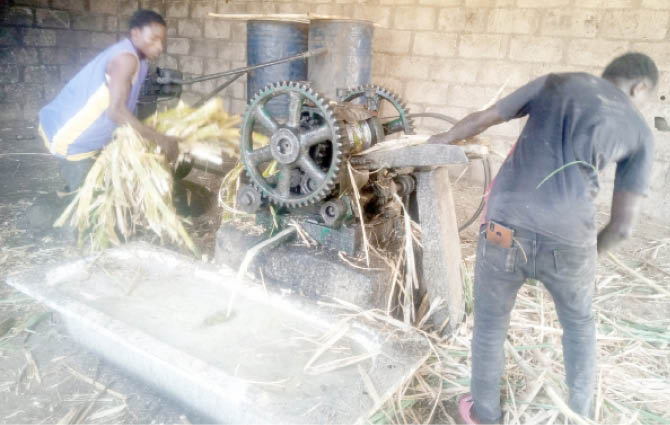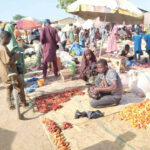Following the high cost of living in the country, residents of Bauchi, especially low income earners and vulnerable people, have embraced the use of locally made brown sugar, popularly known as mazarkwaila, as replacement for the refined white sugar in their foods and drinks. Daily Trust Saturday reports.
Investigation indicates that the price of white sugar has skyrocketed, forcing many poor families to abandon foods and beverages that require sugar. The situation also propelled the demand for an alternative. As a result, many residents have resorted to a local sweetener for their daily use; hence brown sugar is now prevalent and affordable within markets in the state
Findings further revealed that demand for the commodity has revived economic activities at local processing communities, creating job opportunities for the teeming unemployed youths.
It was also observed that increased demand is leading to scarcity of the sweetener, even at wholesale points in processing communities.
- Blistering heatwaves take toll on North East residents
- Tinubu appoints Ja’afar Isa as Executive Secretary of Almajiri Commission
A resident of Bauchi and father of seven, Adamu Abdulkadir, told Daily Trust Saturday that since October last year when the cost of white sugar skyrocketed, he resorted to patronising the local sweetener. “We no longer use white sugar; instead we resorted to mazarkwaila, which is also like a snack,” he said.
Another resident and a mother, Zainab Abubakar, said she resorted to patronising the brown sugar because of its affordability, adding, “Although the price of mazarkwaila has doubled, it is still cheaper than the refined white sugar. I now use it for my family.”
A farmer, who is also a processor of the local brown sugar, Aminu Tukur said, “We process sugarcane and turn it to a liquid substance, which is subsequently boiled to produce the brown sugar.
“This factory has been in existence for the past eight years. And this machine has the capacity to process not less than three trailers in 24 hours. The sugarcane you see now is not our own, we are processing it for those who have boiling points, where it will be condensed to produce brown sugar. We have already processed our own sugarcane. In fact, we started our own on November 8 and accomplished it by the end of January through to the first week of February this year.
“You would notice that production is at its lowest ebb because the season is almost over. This industry has the capacity to employ not less than 150 youths on a daily basis, especially at the peak of the season, from harvesting the sugarcanes, conveying it here, squeezing it and taking it to the boiling point for condensation, then to the point where it is cast. Naturally, a lot of people are being engaged and they are comfortable because everyone will get a minimum of N1,500.
“We have been able to fend for ourselves and others, as well as contributing to the economy of the country.
“At the peak period of production, we start as early as 4am.”
He further said, “At the peak of production last year, we had to store virtually everything we produced. Through the rainy season last year, around June and July, we had so much brown sugar in stock, but today, people deposit money in advance. You would have to make deposits and wait on queue to get the brown sugar.
“It tells you that the inflation caused by the removal of fuel subsidy and subsequent government’s policies have forced indigenous industries to come up. And believe me, we are equal to the task; it is just that we have limitations.
“Our limitations are as a result of poor agricultural policies of the federal and state governments. We have never been aided in any form. In fact, the government doesn’t even know that we exist. They know us on individual basis but not officially.
Tukur called on the government at all levels to invest in brown sugar processing for economic growth and export.
Responding to the challenges of producing brown sugar, he said, “There are many impediments, including the analogue method of production. We are currently in a digital world. Secondly, there is the need to upgrade and meet modern day standard in order to attract more patronage.
“Lack of stable electricity has also been an impediment, not only on agricultural industries but virtually every kind of production.”
A member of staff at a processing factory, who is responsible for boiling the liquid sugarcane and casting the brown sugar, Abubakar Sadiq Abdullahi, also said, “The process starts from the sugarcane farm, where selected youths are assigned to harvest certain quantities and convey to the processing factory, where a machine squeezes the sugarcane and extracts its liquid. Immediately after the extraction is completed, we use customised jerry-cans to convey the liquid to the boiling section, which is just beside the factory.”
“We transfer the liquid from a container attached to the extracting machine to our boiling pots. The boilers are designed more like a bunker with pots made from empty drums. We use the sugarcane waste as firewood to boil the liquid until it becomes thick. We later evacuate the thick product into a big calabash for streaming. Here, we use a stick to roll over the product to become thicker. Lastly, we cast the product in a customised bowl; after 5 to 10 minutes you can remove the brown sugar for consumption.”
The 22-year-old Abdullahi said the brown sugar factory had served as source of livelihood to hundreds of young men in the area. He said, “I have made a fortune from the production of brown sugar to support my parents in running the family. Many of my colleagues who are married take care of their families from this business.”
He, however, said some of their challenges were lack safety equipment and facilities to upgrade and standardise their products. “We need government’s intervention to repackage the brown sugar,” he added.
An operator of the squeezing machine at Tafawa Balewa, Yakubu Usaini, told Daily Trust Saturday that the brown sugar industry had offered opportunities to many youths in the local government area, especially during the dry season.
He, however, lamented, “Our major challenge is lack of safety equipment like hand globes, boots and other protective gears. I still remember how the squeezing machine chopped off my index finger last year. After three months of battling with the injuries, I still came back to my duty post because of the benefits I get.”
A trader who hawks the brown sugar, Abubakar Yakubu, said the high cost of white sugar stimulated patronage for the local sugar because it is more affordable.
He said, “In the last five years, the demand was not like this. Following the increased demand, the local brown sugar, which was not more than N100 last year, is now up to N400 per pair. The patronage rapidly increased because many people no longer buy the white sugar due to its high cost.
“As a result of increased consumption of the local sugar, those of us who sell the product sometimes have to wait for some days before getting it. The business is good.”
Another vendor of the brown sugar, Umar Ibrahim said, “I started this business last year, but in the last three months, I have witnessed good sales despite increase in its price. A pair of brown sugar now sells at a retail price of N300 to N350, but people are still buying it, unlike before when a pair cost between N100 and N150.”
When contacted on the new development, a dietitian at the Abubakar Tafawa Balewa Teaching Hospital, Ibrahim Mohammed Lade, cautioned residents of the state against abusing the brown sugar, especially those chewing it without controlling the quantity they take.
Lade explained that the local brown sugar has the same effect as the refined white sugar because they are both produced from sugarcane.
“We advise that people should minimise the intake of sugar in whatever form or colour. The only difference between the white and brown sugar is that the latter is condensed and has more nutrients, but that does not mean that people should take it anyhow because every individual has a specific daily requirement of calories, carbohydrate, protein and fat. People should not exceed their daily recommended requirements,” he said.
While warning people who have formed the habit of chewing brown sugar indiscriminately to stop, Lade said its only health benefit is that it produces glucose, which is a source of energy because it is carbohydrate and has high calories.
“Brown sugar is the quickest source of energy because if your glucose level is low, it raises it instantly.
“We are advising people to avoid abusing the brown sugar, especially people that are fat, as well as diabetic patients. Diabetic patients should never take brown sugar at all because it will raise their glucose level,” he said.

 Join Daily Trust WhatsApp Community For Quick Access To News and Happenings Around You.
Join Daily Trust WhatsApp Community For Quick Access To News and Happenings Around You.


